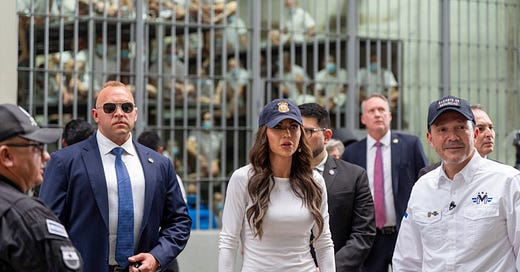
Marjorie Taylor Greene’s Attention Ploy Flops
Plus: The 118th Congress is racking up indicted members.
Marjorie Taylor Greene has been dangling an axe over House Speaker Mike Johnson for weeks, and during that time, she’s further alienated herself from her colleagues and seen her influence severely diminish. It was back on March 22 that she filed a motion to vacate the chair, the same motion that Matt Gaetz used to set in motion the removal of Kevin McCarthy last year. When Greene declared last week that she would give Johnson the weekend to announce a resignation date, it seemed reasonable to assume that meant she would make her resolution ‘privileged’ to trigger an imminent vote on his ouster first thing Monday morning. Instead, she spent Monday seeking concessions and a deal that would allow her to back off while saving face. In other words, she knows she overplayed her hand, and she is now searching for the least humiliating way out of the sticky corner she backed herself into.
At Greene’s request, Johnson met with her on Monday afternoon ahead of the first votes of the day. The meeting lasted long enough that the dozens of reporters waiting outside Johnson’s office began to speculate about the possibility they were working out a deal. The Greene-Johnson confab even bled into a planned leadership meeting, which had to be canceled; top GOP members, like Republican Study Committee Chairman Kevin Hern (R-Okla.) and Freedom Caucus Chairman Bob Good (R-Va.), exited after waiting for a half hour. Finally, after two hours, Greene and her sole ally, Rep. Thomas Massie (R-Ky.), emerged to face the growing crowd of reporters. They offered no new developments. The duo met again with Johnson this afternoon for more than an hour and uncharacteristically, left without any comment. Later, after votes, Greene appeared to soften her stance, telling reporters, “The ball is in Mike Johnson’s court.”
Greene’s weeks-long motion-to-vacate threat campaign has worked out very differently from Gaetz’s against McCarthy last October. Greene’s feud with Johnson isn’t personal. Putting it in a charitable frame, it’s a principled disagreement on policy that turns on Greene’s sincere opposition to funding Ukraine in its fight against Russia. Reading the situation less charitably: Greene is making the kind of ploy for attention that’s become her signature in the course of short career in Washington.
During an interview with Steve Bannon this morning, Greene laid out a new list of four demands for Johnson:
Only allow a bill to be voted on if a majority of Republicans support it.
No more Ukraine funding (a little late for that).
Completely defund the Justice Department prosecutions against Trump.
Shut down the government or impose an automatic 1 percent cut across the board if all twelve appropriations bills are not passed on time.
Greene also repeated her insistence that the public wants a motion to vacate vote on the floor, telling Bannon:
This is what people all over the country are screaming for: They want to see this vote because this vote will expose the uniparty.
But while Gaetz rallied fellow dissidents around his motion to vacate, Marjorie’s MTV attempt feels like a bad cover of the original. She doesn’t have anywhere near the support he did among Republicans, and Democrats this time around have clearly signaled that they will rescue Johnson from the motion if it comes to it. Greene may have been surprised by the lack of enthusiasm for her position from her fellow far-right colleagues, and with the wind out of her sails, she has refrained from actually triggering the procedural mechanism that would force a vote on Johnson’s removal.
When Gaetz gave McCarthy the boot, Donald Trump, the de facto leader of the Republican party, let it happen. By contrast, Trump has instructed Greene to cease and desist, with Johnson confirming as much to reporters.
Greene’s hesitation at the procedural trigger has created an ideal scenario for Democrats. They will be allowed to make much of their commitment to governing by pledging to defend a member of the opposite party from obstructionists and bomb-throwers without actually having to follow through on the pledge. It’s an easy messaging victory. And if Johnson can avoid an afternoon of ugly headlines in light of whatever happens during his meeting with Greene, it will be good for him, too.
Johnson’s not out of the woods yet. He might still run into trouble if he ends up offering Greene a sweetener that upsets Democrats enough for them to decide to leave him to his fate if another motion to vacate comes up this year. With last night’s swearing-in of Rep. Tim Kennedy (D-N.Y.), the Republicans can only afford to lose one vote on anything of importance, and keeping a speaker in place in the months leading up to a general election is certainly important. But as of right now, Greene’s stunt has failed in every conceivable way.
Not-so-smooth criminals
The Justice Department announced its indictment of Rep. Henry Cuellar (D-Texas) on bribery charges last Friday, marking the third federal indictment of a sitting lawmaker since the start of this Congress. Apparently dissatisfied with only setting records for unproductiveness, the 118th Congress is intent on expanding its historical legacy by way of its members’ corruption and unethical behavior. The two other indicted lawmakers are Sen. Bob Menendez (D-N.J.) and the expelled Rep. George Santos (R-N.Y.).
But the Fightin’ 118th will still need to pick up several more indictments before setting any records in that department. In 1980, seven members of Congress were indicted and later convicted for their role in the Abscam scandal, which inspired the film American Hustle. Another banger year for malfeasance was 1994, which is more directly comparable to what’s happening now. That year saw five members of Congress indicted and convicted of various unrelated crimes, including embezzling taxpayer money, using employees as domestic servants who did no official government business, and child pornography. Adding in two other indictments that came down in 1993, the 103rd Congress had seven members total who were formally charged with crimes. (However, only six of those resulted in convictions: Texas Sen. Kay Bailey Hutchinson was acquitted for four felonies and one misdemeanor. The charges had to do with misusing her staff to conduct political and personal business, which seems to have been a very common crime among lawmakers over the decades).
Menendez has faced calls for his resignation from most of his Democratic colleagues. Santos was formally expelled, although his expulsion may have had less to do with the principle of the matter than with the fact that he became such a political liability for Republicans. Not many lawmakers have defended Cuellar so far, but one early defense came from another accused criminal: Donald Trump.
Trump’s defense of a Democrat in a key battleground district Republicans have been trying to flip for years is genuinely hilarious. It goes completely against party messaging for the sake of defending an accused criminal from the other side. He wasn’t the only Republican to take up Cuellar’s cause, either. Sen. Ted Cruz (R-Texas), who should know better, winked at the idea of a conspiracy. According to Washington Post reporter Patrick Svitek, Cruz said:
Given the White House’s antagonism toward Henry Cuellar, it is reasonable to at least want to see the evidence before coming to a conclusion on this.
Condemning a member of the opposite party in a frontline congressional district for an indictment on bribery charges—we’re talking about basic game fundamentals, people: an unhurried political-messaging layup. Actually, it’s easier than a layup. It would be more akin to putting a ladder up to the rim, climbing up with the ball under your arm, and dropping it through the hoop. But scoring the easiest political points imaginable becomes impossible when the leader of your party is actively tearing down the gym with a backhoe.
Statuary Hall Blues
Because they’re always focused on the important things, members of Congress often think about statues: whether to keep them up, whether to tear them down, whether one of their highest-profile donors owns a garden full of evil ones.
If you recall, my Bulwark colleague Hannah Yoest and I documented the various statues of the Founding Fathers in the U.S. Capitol for last year’s Independence Day edition of Press Pass. Each state is permitted to keep exactly two statues on site. This year, the state of Arkansas is unveiling two new sculptures representing important figures from the state’s history. They will replace lawyer Uriah Rose (a founding member of the American Bar Association) and former governor and senator James P. Clarke in Statuary Hall.
Arkansas’s new statues will depict activist Daisy Bates and musician Johnny Cash. The statue of Bates, a civil rights leader and mentor to the Little Rock Nine, is set to be installed this week. The Man in Black will take the floor later this year.
These additions will mark a rare improvement of Capitol statues; lawmakers first decided to make the change five years ago. Despite the long timeline, perhaps the sight of fresh faces in the marble-and-bronze crowd will encourage other states to switch up their own permanent delegation to the Capitol. My hope is that the state of Florida will one day retire Dr. John Gorrie, the physician who experimented with ice-based air conditioning to cool his patients’ fevers, and bring up a cast of skateboarder Rodney Mullen, who invented the kickflip.


















MSM don't seem to care whether the republic is falling apart or not. I am getting news about tornados but the slow death of democracy in America does not seem to be worth mentioning;
Someone said Everything Trump touches dies. Trump touched America
I love that Arkansas is placing a statue of John Cash in statuary hall. When will my old home state of Illinois place a statue of Lou Rawls there?